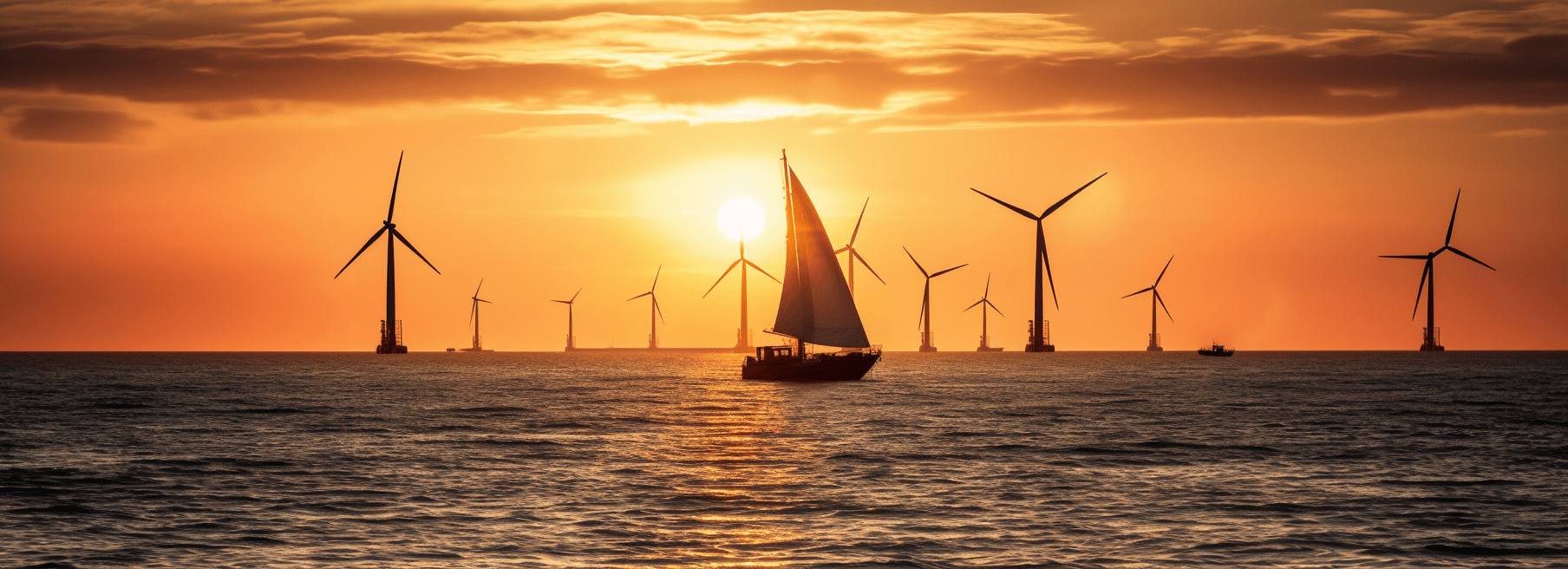
INTELLIGENT ENGINEERING
Revolutionizing Renewables:
UK's Offshore Wind Sector Rides High on Policy Reforms and Innovation
The United Kingdom continues progressing toward a greener, low-carbon energy future, with offshore wind playing a critical role. The country's commitment to achieving net-zero greenhouse gas emissions by 2050 has cemented the importance of offshore wind as a vital component of the national energy strategy. The “UK Hydrogen Strategy” sets out the approach to developing a thriving low-carbon hydrogen sector in the UK to meet the increased ambition for 10GW of low-carbon hydrogen production capacity by 2030.

The UK government recently demonstrated its commitment to clean energy by allocating a £205 million budget for the latest round of Contracts for Difference (CfD), aiming to support renewable energy projects across the country. This funding is expected to boost further the offshore wind sector, which has already witnessed rapid growth over the past decade. Industry association RenewableUK, which counts EPConsult Energies among its members, has expressed support for a significant amendment to the Energy Bill. Recently introduced by the House of Lords, this amendment assigns a statutory duty to energy regulator Ofgem, tasking them with aiding the achievement of net-zero emissions in the UK. RenewableUK’s Head of Public Affairs Nathan Bennett emphasised the benefits of this change for billpayers, stating that:
"Refreshing Ofgem’s mandate so that it better enables the UK’s shift to clean energy is ultimately in the interest of billpayers, as renewable projects are our cheapest source of new power, lowering energy bills as well as strengthening Britain’s energy security."
Navigating Uncertainty
In the current renewables landscape, all aspects of renewable electricity generation in the UK are affected by policy uncertainty. However, the government's policy goals aim to decarbonise electricity generation through increased deployment of offshore wind, carbon capture utilisation and storage, hydrogen, and nuclear technologies.
As the market remains unstable due to the volatility of hydrocarbon prices and rising electricity prices, the UK government has taken regulatory action in the form of new taxes on oil, gas, and some renewable electricity generators. Onshore wind might also have a future in the UK, as the Department for Levelling Up, Housing, and Communities has confirmed a consultation on the construction of onshore wind facilities with support from local communities.
New technologies continue to emerge in the renewable energy space, with two key areas being hydrogen and battery energy storage systems (BESS). The UK's "Hydrogen Strategy" sees hydrogen as playing an increasingly critical role in decarbonising the UK's energy system. This has resulted in a raft of hydrogen pilot projects and financial support through a £105 million funding package administered through the UK's Net Zero Innovation Portfolio.
The capacity of UK BESS projects is currently less than 2 GW, with a total pipeline of 32 GW and 10 GW worth of projects have planning approval. National Grid estimates that the UK will need up to 50 GW of BESS to meet its net-zero targets by 2050.
Viktor Nyics
EPConsult Energies | INTELLIGENT ENGINEERING
More insights:

Hydrogen Challenges and Solutions
Hydrogen, with a history intertwined with the energy sector for over two centuries, is witnessing a remarkable resurgence, particularly as a renewable energy source in the UK's transition from fossil fuels. As the momentum around hydrogen energy grows, so does the question of its safety. While all fuels inherently pose some risks, hydrogen's unique properties, such as a wide range of flammable concentrations and lower ignition energy, necessitate additional engineering controls and careful material selection.

UK's Electric Vehicle Revolution
In a landmark decision that marked the beginning of the UK's Electric Vehicle (EV) Revolution, the UK government announced in November 2020 the cessation of sales of petrol and diesel-fueled vehicles by 2030, and hybrid vehicles by 2035. This unprecedented shift, aimed at significantly reducing the country's carbon footprint, has set the stage for a monumental transition in the transport sector, which accounted for 24% of the UK's total emissions in 2020.

Blowing Away the Carbon
There are several technical and economic reasons that offshore wind power is a viable option for decarbonizing traditional oil and gas production. Firstly, new offshore wind license areas are often located in deeper waters and at greater distances from the coast. Once land is reached, these sites are still far from potential markets. These logistical factors drive up the cost of delivering power to onshore users.

Common Myths About Solar Energy
The myths and misconceptions surrounding solar energy often need to be updated or stem from a lack of understanding of the technology. Solar energy remains efficient in less-than-ideal weather conditions, and while initial costs can be high, the long-term financial benefits are substantial. Furthermore, although the manufacturing process of solar panels does have an environmental impact, the overall effect is far less damaging than traditional energy sources.

From Coal Mines to Clean Energy
The commitment to net zero has impacted all sectors, promoting the need for low-carbon technologies. Around the UK, a vast number of decommissioned facilities are standing disused in previous industrial hubs, and this will only become more common over the coming years as more and more carbon-polluting facilities are closed. More recently, there has been research and investment on how these sites could be used to develop renewable energy sites.

Riding The Waves of Energy
The ocean is a vast playground of untapped energy. Waves, created by the wind's interaction with the water's surface, hold immense potential. Wave energy, also known as ocean wave power, aims to capture this power and convert it into usable electricity. It's like harnessing the ocean's natural heartbeat to power our world. The energy held within the world's waves is the most significant unused power source on the planet, with the total energy potential globally believed to reach a staggering 30,000 TWh per year. To put this into perspective, that's tenfold the European Union's total annual electricity usage.
- Log in to post comments

